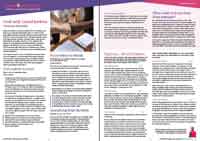Discovering God is a resource offering practical ideas for informal services and events. With a theme-based approach this series can help create community and a sense of belonging.
Guidance on using Discovering God can be found at: www.rootsontheweb.com/dg-intro
Non-Roots subscribers - Welcome! Please take a free trial to explore Roots' resources further.
See also: A tapestry of colour - Chine McDonald's reflection on racism and Scripture

Click on the image to view a PDF.
Micah 6:8 reminds us what God desires from his children: to do justice, love mercy and walk humbly with our creator. Racism goes against justice in every way. Yet there is much injustice and division in our world, and both are so normalised through history and culture, that we can fail to see their impact – they become part of the air we breathe. Stories of racism, prejudice and injustice are regularly in the news and awareness is growing.
Change is needed, but it is slow in coming. Sometimes the Church has been part of the problem. Christians have not said or done enough to be an advocate or a place of safety for those experiencing racism.
Since 1995 the Church in the UK has marked an annual Racial Justice Sunday (the second Sunday in February), to galvanise us to remember, reflect and respond to racial justice matters. You may want to explore further prayers and service resources available on the CTBI website.
Somewhere to start
Here’s a way to introduce the theme.
I have a dream
- Ask the group: What dream do you have for humanity? What would you like to see changed or accomplished in the world in your lifetime?
- Martin Luther King Day will be celebrated in the USA on 15 January 2024. His most famous speech encapsulated his dream for a different world. Read aloud a section of King’s ‘I have a dream’ speech. Do you think God has a dream for the human race?
- The last book of the Bible, Revelation, gives us a picture of the future God is planning for all people – complete unity in diversity: ‘a great multitude...from every nation, from all tribes and peoples and languages’ gather together to worship Jesus (Rev 7:9). Jesus taught us to pray that God’s will be done ‘on earth as it is in heaven’ (the Lord’s Prayer). So, if all races gather together as one to praise Jesus in heaven, then surely we should be looking for that same unity in diversity here on earth.
Mighty God, we remember all those
who are hurting, disadvantaged,and impacted by racial prejudice,
having suffered at the hands of injustice.
May your Holy Spirit be present with them, to comfort and to heal;
to bring justice and reconciliation, one with another.
Amen.
(Prayer by Mark Sturge)
Somewhere to finish
Before the end, come together to gather your thoughts and, if appropriate, to pray.
It starts with me
Give out colourful paper, scissors and pens. Ask people to draw round their hand and cut out the handprint.
- Explain that God tells us we should not allow racism or favouritism to colour our interactions. God made each of us in the image of God; we were created equal. Pause to reflect if participants have raised or lowered a person or a group of people, through their actions, thoughts, biases or expectations. Allow the handprint to be a symbol of positive actions – lending a hand in service, being a friend and ally, voting, advocating, empowering.
- Invite everyone to stick their coloured handprints together to make a collage that represents a combined commitment to action for racial justice.
God forgive us where we have shown favouritism when it comes to ethnicity and race.
Forgive us for when we have been complicit with injustice and racism around us.
Open our eyes, give us courage to do justice,
love mercy and walk humbly towards an end to racism,
and see your vision of unity in diversity made real here on earth.
Amen.
Something from the Bible
Galatians 2:11-21; John 4:7-41
Let's look at some examples of racial barriers in the Bible. Read the Galatians passage (you may prefer a simple translation such as NLT) to see how cultural preference clouds Peter's judgement and affects how he leads. Contrast this with the passage from John, in which Jesus goes against cultural expectations by relating not only with a Samaritan, but a Samaritan woman. In both cases, what happens when the divides created by racism are cast aside?
A read and share idea
Act out the passage in Galatians as it might unfold in our modern-day context. Peter was trying to fit in with both the Jews and the Gentiles, but he was caught out. If you are playing the role of Peter, which group might you initially be embarrassed to be seen with?
In the John passage, when Jesus’ disciples arrive, they are astounded to see him speaking with the Samaritan woman. Act out a scenario where you are having a spiritual conversation with someone who might regularly experience racism or prejudice:
- How could you respond to onlookers, like the disciples?
- In what way does Jesus become an ally to the Samaritan woman?
What could we learn from these passages?
Paul challenges Peter for altering his behaviour to fit in with societal norms, rather than living out God’s values of equality. The Early Church agreed that followers of Jesus did not have to follow Jewish customs but in practice – as Peter demonstrates – there was still division and prejudice.
- Are there cultural expectations of what Church or Christian behaviour should look like today, that are simply cultural and not essential to following Jesus?
- Do you think the modern Church puts up barriers to faith for people from different cultural backgrounds? If so, what can we do about them?
Jesus gives us a glimpse of heaven, telling the Samaritan woman that a time is coming where true worshippers will not worship the Father in geographical locations where we are easily divided by race and tradition, but in Spirit and in truth, where we are all united.
Explore... Racial justice
Choose from these ideas to help people of all ages explore the theme together. Use the spiritual styles indicated by the coloured letters to help you plan, and cater for the different ways in which people connect with God.
Spiritual styles (as defined by Dave Csinos) key: Word, Emotion, Symbol, Action.
Find out more in Worship and learning support.
Friendship circle W A
Think about the people in your closest community. Are they all like you: e.g. similar in age, cultural background, race and economic status? Invite people to draw a circle or overlapping
circles on a piece of paper illustrating their friendship groups.
- What characteristics unite those people?
- What support do you give or receive from those social circles?
- What people are you unlikely to interact with and engage with?
- How can you be more intentional about widening the pool you draw your friendship circle from?
- How can you keep these new friendships from being tokenistic?
- What are the challenges to widening your circle?
Food sharing W A
A key way to combat racism and prejudice is through relationship. Many times, friendship comes about by eating together – sharing food is an act of welcome. Ask your group to prepare and bring food or snacks that represent their cultural background. Invite people to share a little bit about their background and why that food is special to them. e.g.:
- What would it be like if you couldn’t buy that snack or get the ingredients to make it again?
- How does sharing this food make you feel?
Truth telling E A
Watch a video from theologian Jackie Hill Perry.
We very often avoid conversations that we find uncomfortable, but the Bible says: ‘You will know the truth, and the truth will make you free’ (John 8:32). If you have someone who would be willing to share their experience with your group, talk to them about how it feels to be a person of colour in your community. Be sensitive to create a safe environment as these conversations can be triggering and exhausting because you are asking that person to share difficult experiences. Encourage everyone to be open to hearing thoughts and experiences that they may never have considered before. Alternatively, you could view a section of We Need To Talk About Race: Black Experience in White Majority Churches (2019) and reflect on their experiences.
Windrush stories W E
2023 was the 75th anniversary of the arrival of HMT Empire Windrush, a ship bringing hundreds of passengers from the Caribbean, who came to the UK to fill post-war labour shortages. The British Library collected stories and images to help us remember their courage and the racism they faced living in the UK. Ask someone to read out stories from Floella Benjamin and Leroy Logan.
Reflect and discuss:
- Who in your community has been or is being mistreated?
- What could you do to bring justice and be an ally to them? Floella had a spiritual experience where she felt challenged about how she handled racist abuse. Leyroy felt called to bring change from within.
- What message do you need to hear from God about racism?
Beautiful diversity S A
Buy or make gingerbread people and assorted colours of icing. Ice each part of the body (left arm, right foot, etc.) a different colour to represent the diversity of God’s people. Perhaps give the different icing colours different flavours too: how much more enjoyable are the gingerbread people because of the variety adorning them?
In 1 Corinthians, Paul uses the metaphor of a body to describe the Church: how we are all different but united in purpose and love (1 Cor 12:12-27). ‘There should be no division…If one part suffers the whole body suffers.’
Racism in the Church divides us and causes suffering, so we must be proactive to bring about change and see the unity that God desires.
 |
Ruth Akinradewo uses her voice to advocate for the voiceless and to proclaim liberty to the captives: this she does as a writer, speaker and worship leader. |